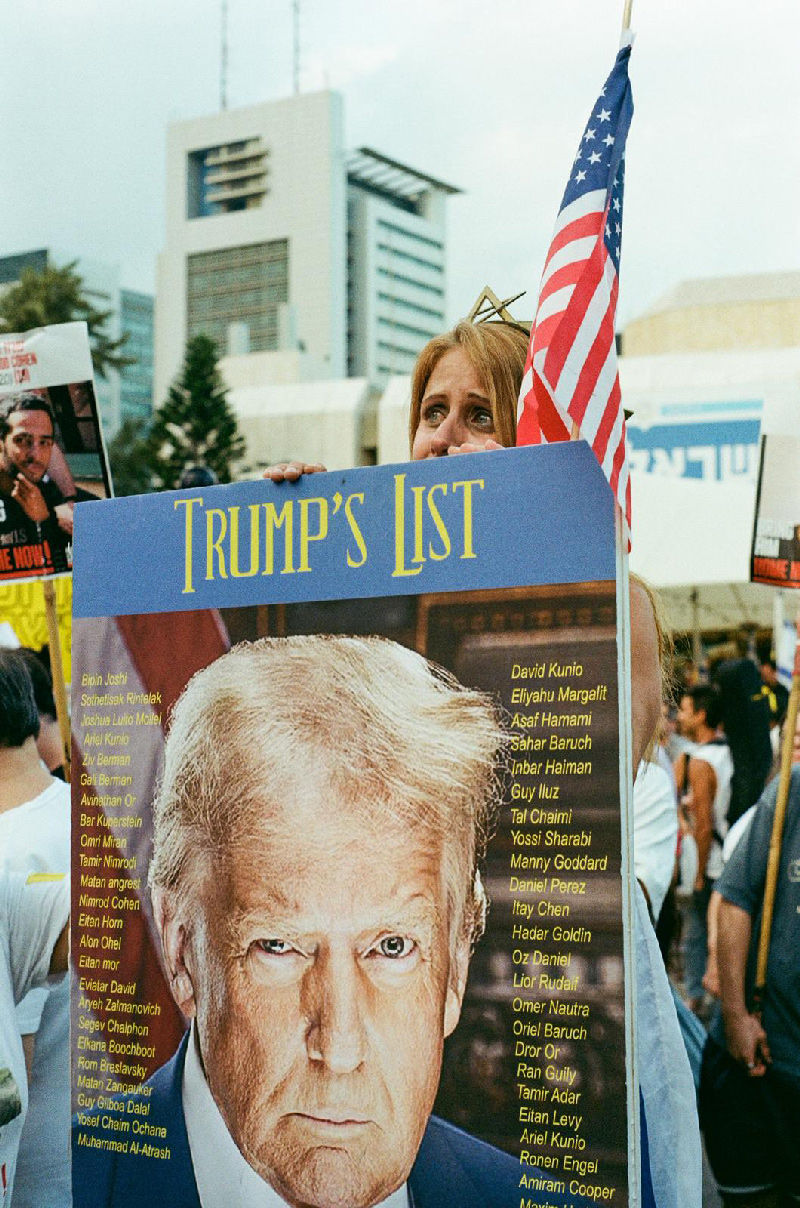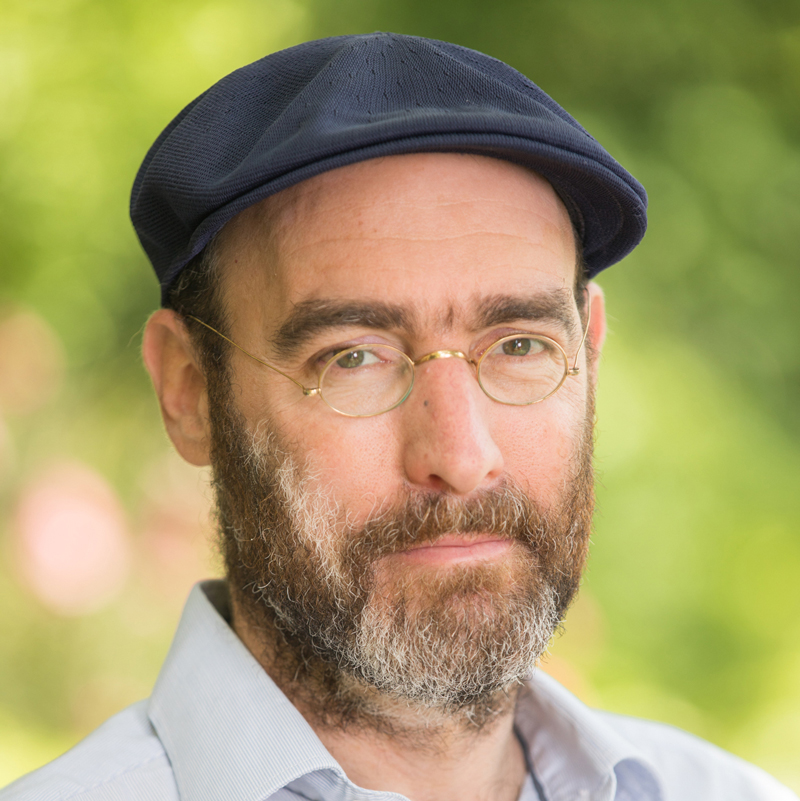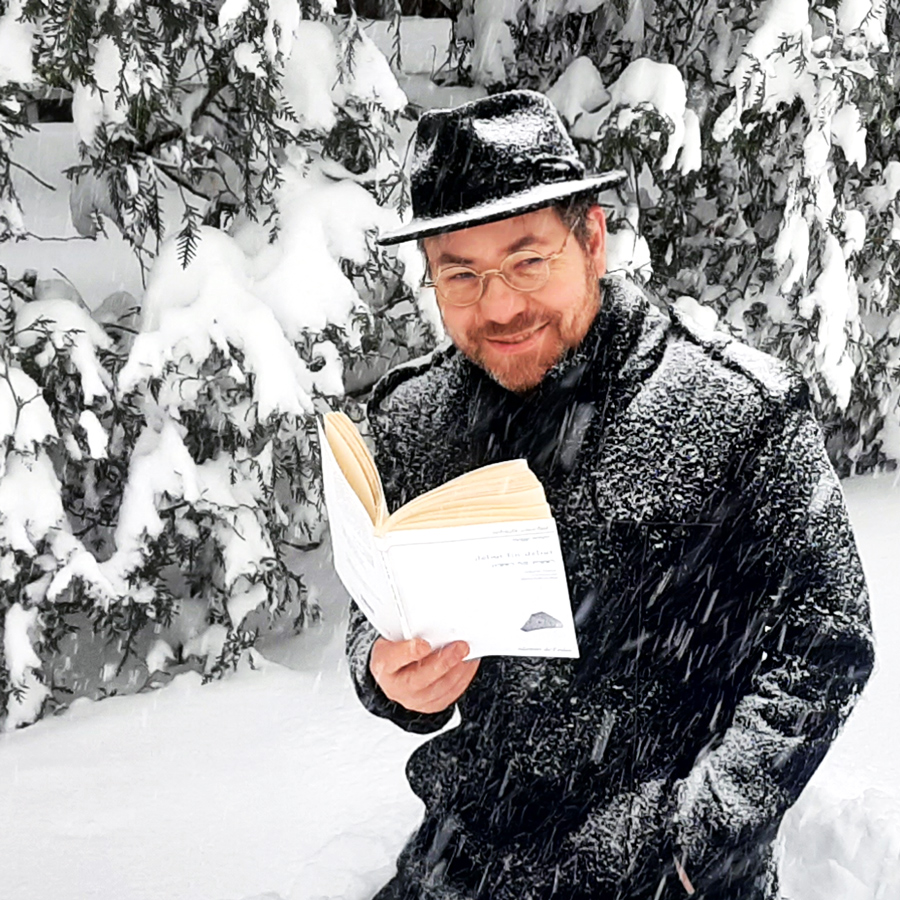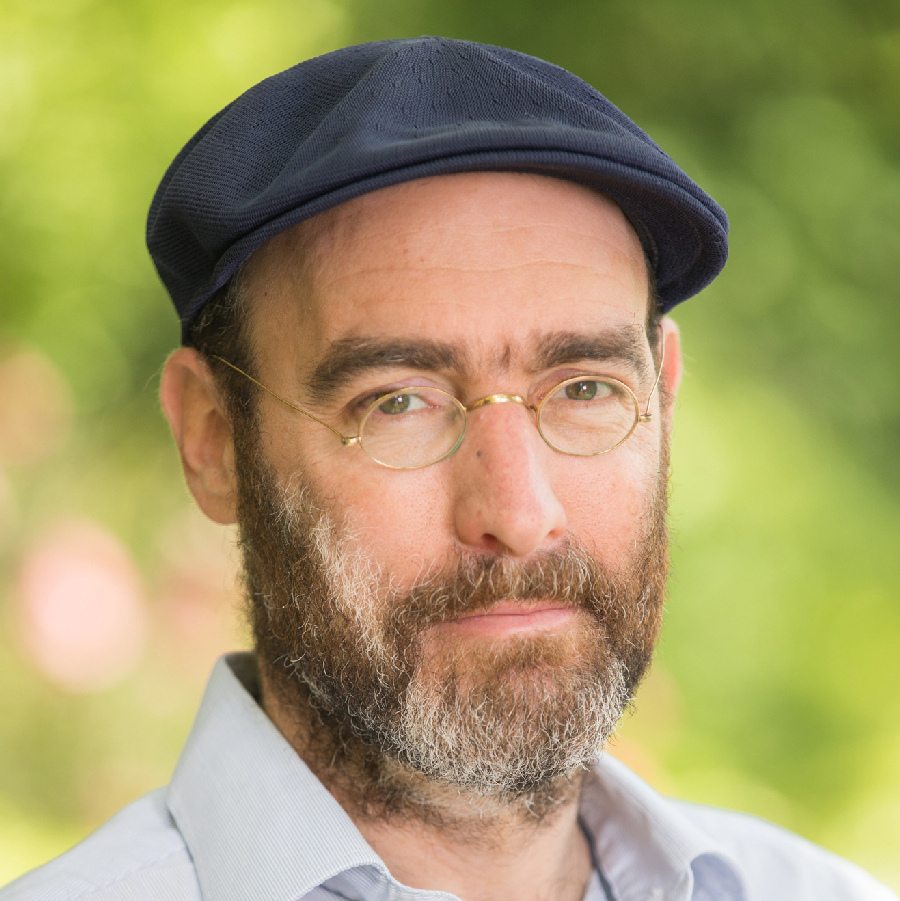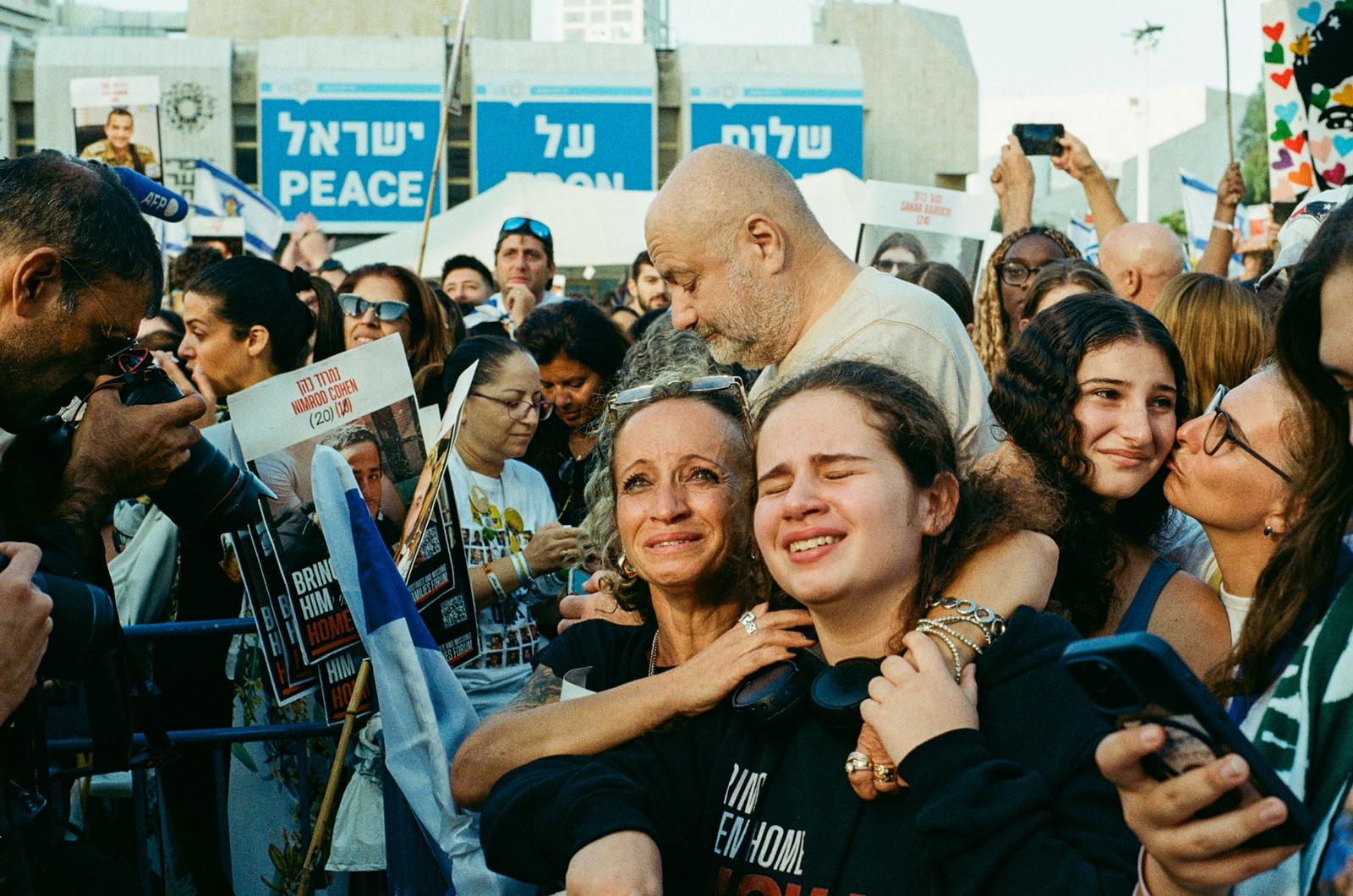Lire cet entretien en français / Read this interview in French
Antoine Strobel-Dahan – To begin with, how would you describe the political and emotional atmosphere in Israel since the announcement of the “Trump Agreement” and the release of the last 20 living hostages, one week ago ?
Tomer Persico - In one word — better. I think everyone is feeling better. There’s a sense that we can finally breathe a little more easily again. People feel it’s possible to live daily life without constantly worrying about the hostages, the soldiers, or the Palestinians. It’s simply a relief — the feeling that the war is probably over and that we can start rebuilding. Of course, there’s still a huge amount of work ahead, and it will take years, maybe even longer. But at least we can begin. So overall, I’d say people feel better, and there’s a sense of relief that one stage has ended and another is beginning.
ASD - Would you say that confidence is also starting to return – confidence in the future, in peace, in the durability of this ceasefire?
TP – No, I wouldn’t. I’d say no to all of those. People are still deeply traumatized by October 7. And beyond that, there’s really no guarantee that this ceasefire will hold. Personally, I’m a bit optimistic – but still, there’s no real assurance. And finally, we still have this, I’d say, terrible government. They didn’t waste a single minute after the war ended before resuming their attacks on the judicial system, on the rule of law, and even on ordinary citizens who simply disagree with them. We’re back to where we were before October 7 : a nation split in two, with a government that treats those who didn’t vote for it unfairly and undemocratically.
ASD - Talking about this government – last Wednesday, the Supreme Court ordered the government to establish, within 30 days, a state commission of inquiry to investigate October 7 – something Netanyahu had resisted until now. It seems to me that whether or not he complies will say a lot about how much damage has been done to Israel’s judicial system. What happens if he simply defies the Court and refuses to create such a commission?
TP – Netanyahu has always been extremely careful over the years never to do anything that is blatantly illegal. I don’t think he will openly defy the Court. I expect they’ll try to set up some sort of investigative committee, but of course it will be filled with people of their own choosing, and its mandate will cover only the areas they want to examine – not the ones they don’t. They’ll try some kind of trick like that. But I really don’t think Netanyahu will openly challenge the Supreme Court. He’s never done so before, and he most probably knows that doing so would deal a serious blow to the legitimacy of his government – not only domestically, but internationally as well – and he doesn’t want that.
ASD - From what I understand, a state commission is established by the government, but its members are appointed by the Chief Justice of the Supreme Court. Is that what he’s trying to avoid?
TP – Of course he’s trying to avoid it. But the Supreme Court is just the excuse. What he really wants is to avoid a serious investigative committee — because such a committee would inevitably find that he was involved, that he bears at least some responsibility for the terrible negligence that led to October 7.
In Israel, the government is seen as an obstacle to the return of the hostages, and Trump as the person who actually made it happen.
ASD - On Friday, October 10, Steve Witkoff and Jared Kushner stood on Kikar HaHatufim, the Hostages Square in Tel Aviv to address the crowd before the hostages were released. When Netanyahu’s name was mentioned, the audience responded with boos. Why did Netanyahu’s supporters react with such outrage to a kind of public opposition that has been part of Israeli life for years — even before October 7?
TP – First of all, they were upset because it was embarrassing internationally. Of course, there are demonstrations all the time, and obviously the opposition — and many Israeli citizens — don’t like this government. But this one was broadcast all over the world. And it wasn’t only the booing of Netanyahu, but also the cheers for Witkoff, Kushner, and Trump. In Israel, the government is seen as an obstacle to the return of the hostages, and Trump as the person who actually made it happen.
Another reason, perhaps, is that the issue of the hostages has become a point of contention between many citizens and the government. Netanyahu tried to delay any deal for a long time, but at this moment there’s a national wave of joy and relief — a collective welcome for these people who have been held in the most atrocious conditions for two years. And yet, the coalition isn’t really part of it, because they weren’t part of the demonstrations. I, like many others, was out in the streets almost every week demanding the return of the hostages and an end to the war. Now this is happening, and they’re not part of it. I think they felt somewhat insulted — that, in that moment, they were left out of the Israeli consensus.
ASD - The political right in Israel condemned what they called a lack of unity. At the same time, however, there’s no shortage of criticism of the protesters and the opposition coming from within the coalition. What kind of “unity” are we talking about?
TP – Indeed, for them, unity means unity behind the government : you must follow and support it. They don’t really mean compromising with the other side, or genuinely sharing power, even in the simplest form. And their actions show it clearly. Just one day after Netanyahu gave a speech declaring that this was a time for healing, togetherness, and unity, the Speaker of the Knesset, Likud member Amir Ohana, chose not to invite either the Chief Justice of the Supreme Court or the Government’s Legal Advisor to Trump’s address to the Israeli parliament. These figures should always be invited to such official ceremonies in Israel. So they talk about unity, but their own actions show the opposite : they’re not reaching out to the other side, and they’re not even respecting basic protocol.
ASD - Let’s talk about that episode — Trump’s address to the Knesset on Monday, October 13, the very day the last living hostages were released. I’ve read in the Israeli press that it was a kirkaas — “a circus” — with Trump applauding the expulsion of opposition MKs, lawmakers cheering, and the American president calling out to his Israeli counterpart from the podium to ask him to cancel Netanyahu’s trial. What does that bizarre moment tell us about Israel’s sovereignty?
TP – It is bizarre. And it’s clear to anyone following the news — on both the left and the right — that Israelis are no longer in control of their own destiny. Essentially, it’s the United States — Trump, along with Kushner — who are deciding what happens to Israel.
Just look at what happened on Sunday [October 19]: soldiers were killed in Gaza, and members of the government, even high‐ranking ministers like Smotrich and Ben Gvir, declared that the ceasefire was over — that it was time to resume the war and “finish the job.” But Netanyahu didn’t act on it. The IDF bombed a few houses, the ceasefire was quickly restored, and nothing more happened. Of course, this was a direct order from the Americans.
It may sound unbelievable, but the truth is that Netanyahu has to do whatever Trump tells him to do — or not to do. Netanyahu has burned his bridges with the Democrats ; he has no leverage in Congress or in any other circles of power within the American administration. Even internationally, he has only Trump left : Europe has turned its back on him, and Russia and China are certainly not an option.
Trump now wants this ceasefire — and not only this ceasefire, but also lucrative real estate deals in Gaza’s reconstruction. That’s it. That’s what’s going to happen. And that’s why there’s a ceasefire. By the way, this is why I’m a little optimistic : these people stand to make a lot of money from the ceasefire and from rebuilding Gaza, so it’s in their strongest interest to keep it going.
If it had been up to Netanyahu, he would have kept the war going.
ASD - Netanyahu wants to be praised for the agreement, but it’s widely said that he had no real choice — he signed it because Trump told him to. Still, it seems there was some sort of deal between them — something like, “I’ll sign for you, but you’ll come to the Knesset and make me ‘King of Israel.’” Is there a mutual interest here, not just in rebuilding Gaza or in business, but also in ego and status?
TP – Yes, there is. But if it had been up to Netanyahu, he would have kept the war going. It was the most comfortable thing for him — continuing the war kept his coalition alive with the fewest problems. It also allowed the government to basically do whatever it wanted, because during wartime it’s very hard to protest, and very hard for the opposition to challenge the government’s actions. So I think he would have kept the war going, but Trump made him sign the deal. And in that case, Netanyahu’s compensation was that Trump would come and flatter him a bit — call him a great leader, and so on.
ASD - There was similar pressure from Netanyahu on his cabinet to make them sign the agreement — and they did. Yet, any similar deal proposed by anyone other than Trump would likely have been rejected by his supporters and by his own government. Even the far-right ministers, the ones who constantly threatened to bring down the coalition, accepted it and stayed in government. How do you explain this selective acceptance?
TP – First of all, we need to recognize that perhaps only Netanyahu could have pushed this deal through. It’s important to understand that — and I’m almost tempted to say that it’s a good thing he’s prime minister, because if a deal were ever forced on Israel to recognize a Palestinian state, only Netanyahu could make that happen, even if he would do everything possible to avoid it. In that sense, it might even be a good thing.
As for the far‐right ministers, it’s almost unbelievable how cynical they are. These are people who, in interviews, said that they would — sadly but deliberately — push for the continuation of the war, even at the cost of the hostages’ lives. And now that the war is over, they simply remain in government. It’s shameful, but that’s also part of the reality we’re living in — a populist government that truly has no principles.
ASD - These two ministers in particular — and maybe a few others — if they left the coalition, wouldn't their weight in the Knesset be very small?
TP – Of course. They will never reach the kind of senior positions they have in this government again. Smotrich, for example, will never be Finance Minister again — at least not logically. So of course, they’re holding on.
Even the right wing knows this isn’t the victory they had imagined.
ASD - There’s also a battle of narratives. We hear words like “full victory for Israel,” “the best deal ever”… But I wonder to what extent this really refers to Gaza and this war, and to what extent it’s a symbol of something deeper — a struggle over identity, legitimacy, over who holds power, who can claim victory, who deserves praise for such a “total victory,” and so on.
TP – I actually think that since the war ended — since the ceasefire began — we don’t really hear these slogans anymore about “full victory,” “absolute victory,” nitsachon mukhlat. We don’t hear them because even the right wing knows this isn’t the victory they had imagined. They’re praising Netanyahu and now saying exactly the opposite of what they said before : that this is a good deal, that it’s good the war is over — whereas just days earlier, they were saying that no deal should ever be made.
One of Netanyahu’s most devoted flatterers (in Yiddish we say tukhes-leker) wrote, the very day before the ceasefire : “No deal should be made. We don’t make deals with Nazis. Only full victory and the total annihilation of Hamas.” A day later, he deleted that tweet and wrote : “Fantastic deal, all honour to Netanyahu.”
ASD - To what extent are you worried that now there are no more living hostages in Gaza, a total war could break out? The pressure inside Israel will, of course, ease a little, with no risk to the lives of those hostages. What’s the risk, in your view, that any shooting incident or act of aggression could serve as a pretext to resume a full-scale war — to “finish the job,” as they say?
TP – It is a risk, but I don’t think it will happen unless Hamas really crosses the line and attacks Israel again. As long as we’re only talking about minor skirmishes between Hamas fighters and IDF soldiers here and there, I think the ceasefire will hold — simply because many powerful players have a vested interest in keeping it alive.
But if Hamas goes crazy again and kills a lot of soldiers, or even civilians, then yes, the ceasefire could collapse. And yes, in that case, there’s a real danger that Israel would go even further and respond with even greater disproportionality. I certainly hope that won’t happen.
In the West Bank, from my point of view, it’s a real tragedy — one that will have long-term consequences.
ASD - While all eyes are turned toward Gaza — the hostages and the ceasefire — what’s happening in the West Bank?
TP – In the West Bank, from my point of view, it’s a real tragedy — one that will have long‐term consequences. Over the past two years, and especially throughout the war, there have been many cases that amount to ethnic cleansing, in which settlers managed to drive out small Palestinian and Bedouin communities across the West Bank, the Jordan Valley, and Samaria — in many, many places — and replace them with small outposts of what we call the “hilltop youth.”
This has come with a great deal of violence against Palestinians : vandalism, the burning of houses, of cars. It’s happening all the time in the West Bank. There is no police, no law and order — at least not if you’re Palestinian. And the IDF does not protect Palestinians as it is obliged to under international law. It’s a sad situation — truly a tragedy.
ASD - We’ve seen situations quite recently where some soldiers were even threatened or attacked by settlers when trying to intervene. Could that cause a radical shift in Israeli society? Because maybe people don’t really care about the settlers, but they do care about their children in the army.
TP – I’m sorry to disappoint you, but this has been happening for years. It’s not the first time soldiers have actually been attacked by settlers — stoned, or even beaten with sticks. Most Israelis find this situation outrageous, but they don’t really hold anyone accountable. Usually, they believe the settlers when they say these are just small groups of wild kids, youngsters they can’t control — extremists or anarchists on the margins.
Now, most settlers are basically good, honest people — I’m not saying they’re not. But these young hooligans are the ground forces of the far‐right politicians in government. They’re not acting without direction from above. They’re not simply anarchists. They’re building outposts in places that are connected to electricity and protected by the IDF. They’re sent and supported by the government — by the most extreme elements within it.
It’s not official Israeli policy, but pragmatically, that’s what’s happening. Some settlers certainly feel uneasy about it, but others will say that this is all part of the game — that they should grab as much land as possible while this government is still in power.
ASD - I’m not asking you to predict the future, but how do you see the coming months for Israel — for Israeli society?
TP – If the ceasefire holds, Israel will be entering an election year, and things will start heating up. I think we’ll see violence between groups of protesters, and attempts by the government to push through as much as it can in the final months of legislation. We also have a new head of the secret service who is an extreme, fundamentalist, religious Jew — God knows what he might do with the power he now holds.
So yes, it’s going to be… interesting.
ASD - So you’re not pessimistic, but not optimistic either, correct?
TP – First of all, I’m glad that Trump intervened decisively and stopped the war. I hope he’ll continue to keep Netanyahu in check, and that the ceasefire will develop into a more sustainable agreement between Israel and whoever governs Gaza — that’s my main concern. My second major concern is, of course, democracy in Israel. We’ll have to fight for it, and that’s what we’ll do — but at least now, without our hostages in Hamas’s hands, without soldiers dying, and without Palestinians dying.
